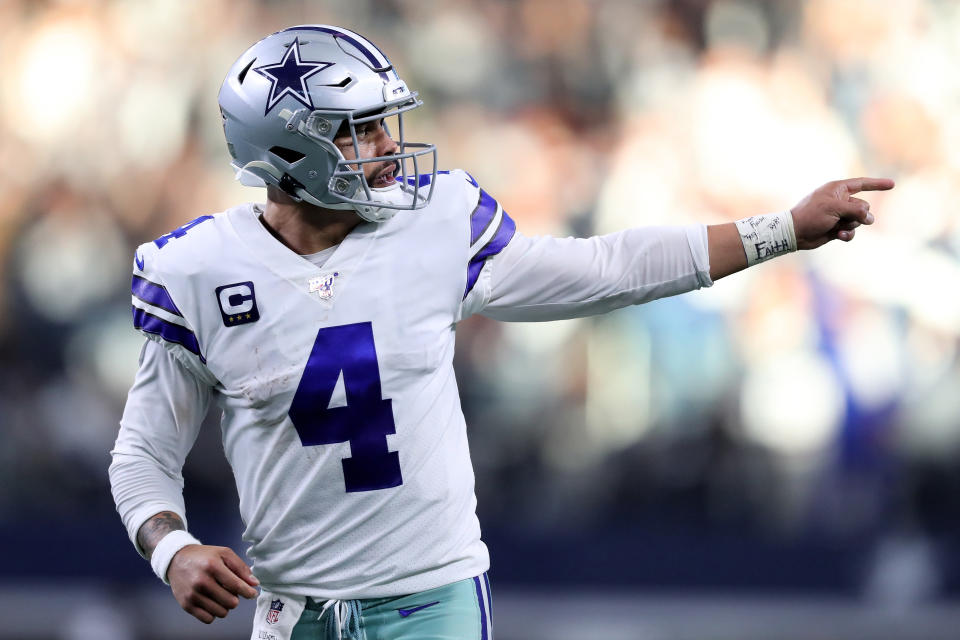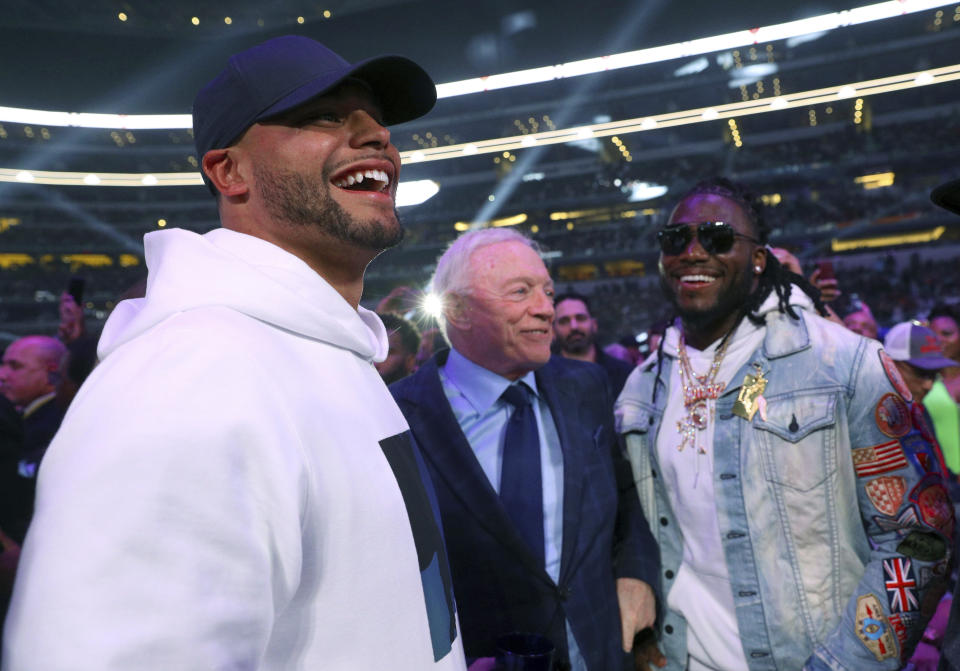Cowboys blew it with Dak Prescott in 2019. That’s why there's no long-term deal now – and why he may exit later.
The stage was set for the two sides to meet in the middle. In the end, the Dallas Cowboys and Dak Prescott could never agree on what the middle really was.
The signing deadline for franchise-tagged players came and went for the Cowboys and Prescott to ratchet down and work out an extension Wednesday, ending hopes that both would surrender a little territory now to shape the entire kingdom together in the long term. But there was no extension to be had. And despite what anyone might report about which side was ready to get a deal done, multiple sources familiar with the negotiations told Yahoo Sports on Wednesday that it was never near a home stretch. In fact, the accounts suggest the shared optimism for a deal has never gotten near where it was in August of 2019, when there was momentum for the Cowboys and Prescott’s camp heading into the season.
That is when this deal should have been completed. Late August in 2019 is when Dallas should have pinned its hopes to a four-year tack-on deal with numbers that would have matched the four-year, $140 million extension the Seattle Seahawks’ Russell Wilson signed. At the time, sources say Dallas balked at such a notion, favoring a slotting of Prescott that would have put him between the Philadelphia Eagles’ Carson Wentz and the Los Angeles Rams’ Jared Goff, but also with the same elements of six years of control the Rams and Eagles got in their deals.
If you don’t know it by now, let’s make it clear one last time: this is where the impasse started. And it was only going to be broken by someone surrendering something of significant value. Dallas wanted a discount and control. Prescott wasn’t giving up both. Eventually, the math was the only language that mattered — and Dallas let that math get way outside of its comfort zone.

2 mistakes Cowboys made in dealing with Dak Prescott
That’s where the miscalculation comes in. And it was basically all on the Cowboys’ end. Dallas thought all along that it was pricing Prescott’s market fairly. It never seemed to grasp two things that Prescott telegraphed to the franchise.
First, he switched to CAA agent Todd France in the summer of 2018, a move that was a clear insinuation that Prescott was going to reach for his maximum value at the point a deal was consummated. In a scenario like that, getting a contract done earlier is better. And Dallas should have had a framework for a deal done late in the 2018 season, before other quarterbacks from the class of 2016 started to do their own extensions. The longer Dallas waited, the more it would be a certainty that Wentz and Goff would factor into negotiations. As they ultimately did when Dallas failed to come out of the box with the kind of $32-million-per year offer that would have expedited a deal heading into the NFL’s scouting combine in 2019.
The second thing Dallas failed to grasp was if Prescott didn’t get a deal pacing his value ahead of extensions for Wentz and Goff, he was going to bet on himself all the way to free agency, even if that meant going year-to-year through the 2022 season. Essentially, once Prescott went into 2019 without a deal, the only chance Dallas was going to have at a discount was going to be if Prescott fell flat on his face. And when he didn’t in the first three games of 2019, his camp knew the price was going up as the season progressed. That’s what happened, widening the problems between the two sides.
Prescott set up to make over $120M over 3 years
All of which brings us back to the math that has tied Dallas into knots. With Prescott having to bet on himself last season and not inclined to give a discount the Cowboys wanted — and why would he after Ezekiel Elliott’s deal in the summer of 2019 — it set up the monster of all scenarios. The one where Prescott’s number put him in position to be the highest paid player in the NFL from 2020 through 2022. Which he will be if Dallas places the franchise tag on him for the next three years, at a tune of more than $123 million in guaranteed dollars. Salaries that are expected to break down into $31.4 million in 2020, $37.7 million in 2021 and $54.2 million in 2022.
For some perspective, Prescott will outpace league and Super Bowl MVP quarterback Patrick Mahomes in basically all three years of those deals. And he’ll have the opportunity to hit free agency after each of them, should Dallas keep upping the franchise tag ante after 2020. All of which means Prescott could be the highest paid player in the NFL over the next three years, then enter free agency following 2022, when he could strike a deal that would continue to make him the highest paid player in the league for years to come.
Of course, Prescott has to continue producing in Dallas. That means another step forward in 2020, accompanied by consistency in 2021 and 2022. That’s the rub that Dallas has never taken advantage of simply because Prescott has been willing to take the risks of a year-to-year deal to max out his value, much like Kirk Cousins did with Washington in 2016 and 2017. And lest anyone forget, Cousins’ decision has put him in position to eventually retire as one of the highest paid quarterbacks in NFL history. Much like Drew Brees, who played under a franchise tag and then went on to repeatedly maximize his value over the past 14 years with the New Orleans Saints.

How Dallas, Dak could break up
Given all of this information, Dallas had to cross a bridge that it had long refused heading into Wednesday. It had to come to grips with the reality that Prescott had $123 million in guarantees in front of him in the next three years. And his average salary in that span would be $41 million per year. That leverage alone put the hope of getting a Goff-like contract well into the rearview mirror. Once again, the time for a Goff deal was early in the 2019 offseason. And then the time for a Wilson deal was prior to the 2019 season kicking off. And the time to demand control beyond four years was long gone, largely because Prescott had gone into the 2019 season willing to put all the risk onto his shoulders — which removed a card that Dallas could play in negotiations.
So what happened? Well, from the sources who were familiar with the talks, there was never an agreement on the middle ground. Not on the years. Not on the average salary. Not on the guarantees. And each of those columns related to the others. Dallas was never getting more years without more money and more guarantees. Which meant if a four-year deal was a nonstarter for the franchise, it needed to come to grips with Prescott’s tags boosting him into the $40-million per year quarterback territory.
That didn’t happen, so this never got close. Now Dallas is in a predicament that will get only worse, particularly with the 2021 salary cap likely to be flat because of revenue losses due to COVID-19 this year. Which means the Cowboys will have to juggle the structure of some deals next year to make Prescott’s $37.7 million guaranteed salary fit if he’s tagged again. Which he likely will be, unless he suffers a major setback or injury in 2020 that causes his extension value to be recalibrated.
As for that $54.2 million price tag in 2022, it’s an unthinkable figure for Dallas. One that could spring him into free agency after the 2021 season. Or it could force Dallas to break the bank and stomach the bitter reality that making Prescott the highest-paid player in football following the 2021 season — if he continues on his trajectory —can’t be avoided.
Certainly there will be no room for discounts at that point. And in reality, there wasn’t much room for a discount Wednesday. That time came and went one year ago. Dallas should have known where this was going then. That it didn’t led us to this point and a set of options that will get only worse if Prescott plays well — including a divorce driven by a quarterback market the Cowboys have never played correctly.
More from Yahoo Sports:

 Yahoo Sports
Yahoo Sports 